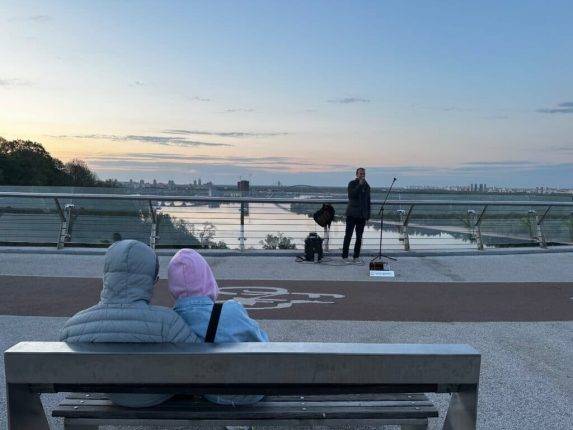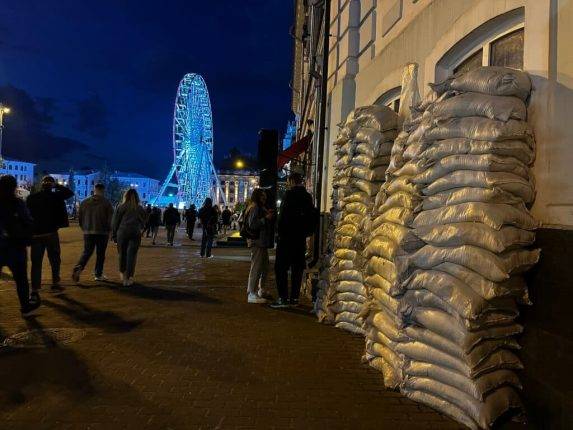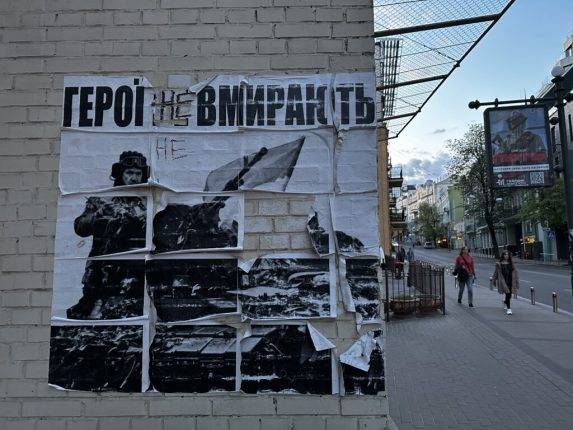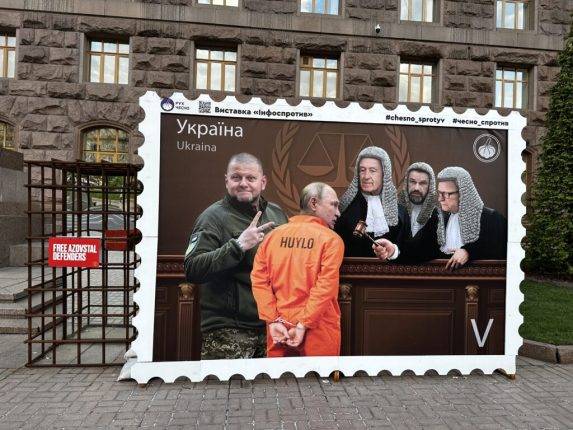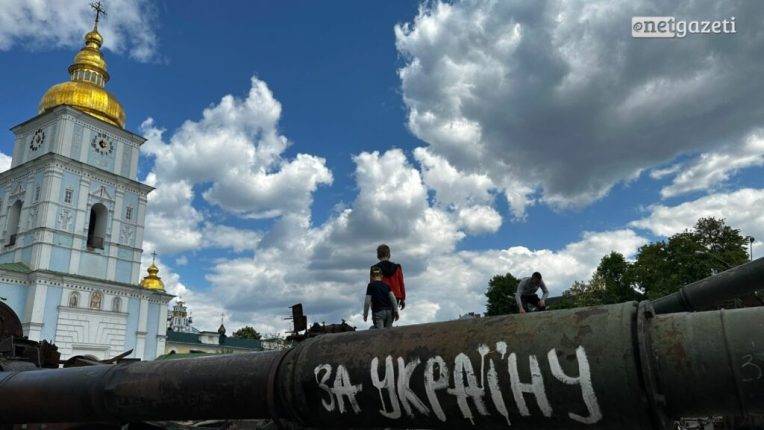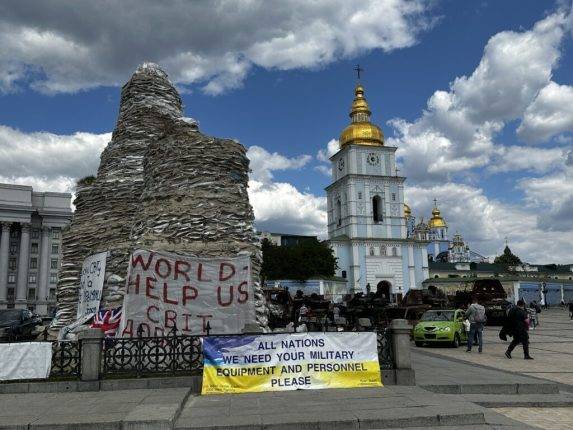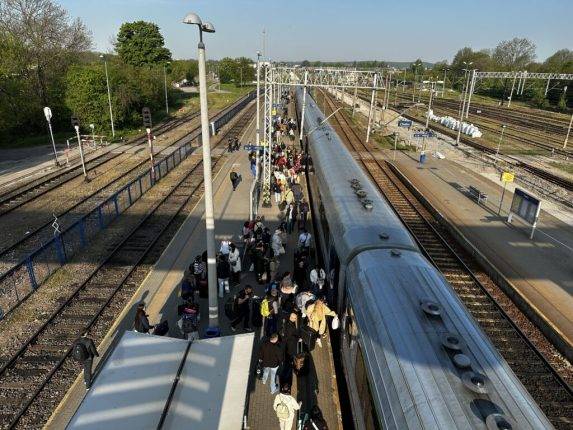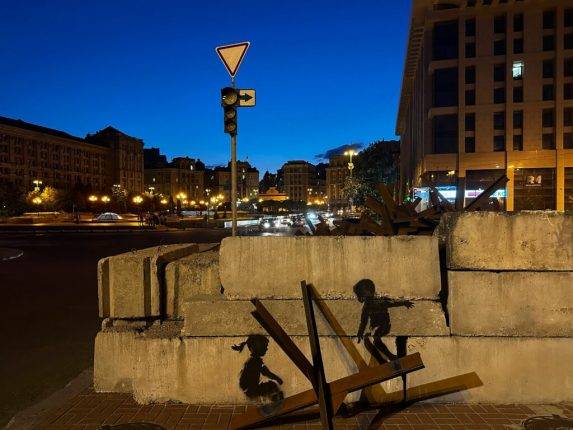
How I got used to air raid alerts – A Georgian journalist’s story from Kyiv
23/06/2023
The last Sunday of May sees the celebration of Kyiv Day marking the foundation of the city in the year 482 — for a second year modestly, under conditions of the war. Russia launched yet another massive air attack on the Ukrainian capital on Kyiv Day, killing one person and injuring two. Nino Chichua, a journalist for the Georgian Netgazeti news website reports on how Kyiv and its inhabitants get on with life under permanent air alert.
It is one year since Kyiv Opera resumed its performances after a compulsory suspension caused by the war. Initially, it gave two performances a week, then three after most of its members returned from evacuation. The capacity of the Opera House is 1,300 seats, but now, to allow safe evacuation only 450 tickets are sold. If there is an alert during the performance, the audience is invited to the opera’s bomb shelter in the cloak room. When the alert has been lifted, the performance resumes from the point where it was interrupted, though sometimes there is no point in continuing the performance – once the air raid alert sounded just 3 minutes before the end of La Traviata.
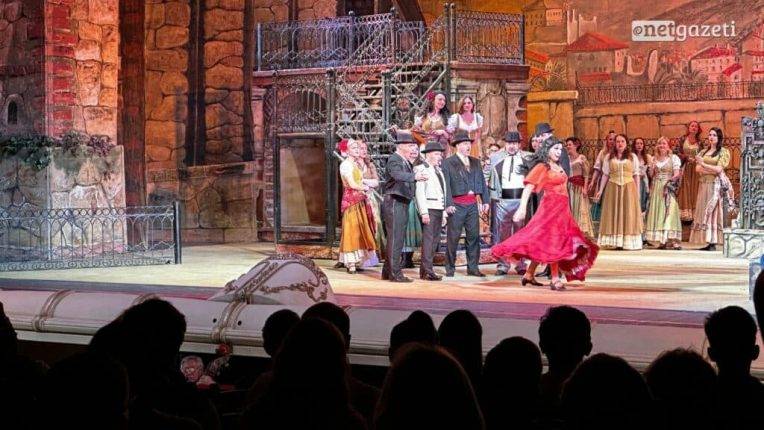
“On that day Violetta survived…” recalls Lyudmila Movlenko, National Opera representative.
A year and a half ago, when Russia deployed nearly 100,000 troops at the Ukrainian border and when everything indicated that war was imminent, very few people imagined that the Russian army would go beyond eastern Ukraine and try to capture Kyiv, but that was exactly what they did. After an unsuccessful attempt to besiege the capital, Russian forces retreated from the Kyiv and Chernihiv regions, though they have continued their air attacks on the capital to this day. Ukrainian air defence systems deal with the Russian missiles and Iranian drones, mostly with success. And Kyiv, though with regular air raid alerts and curfew restrictions, has returned to normal life.
Citizens of Kyiv explain how their daily life has changed in the last year – they have got so used to the air alerts that many of them no longer run for the shelters at every air raid alert. What they cannot get used to are the innocent people who have become the daily victims of this war; the war has empowered ordinary people, deepened their love of life and the motherland, and they have cut off all links with Russian relatives saying they would never forgive them.
“Life is wonderful in Kyiv. Firstly, because I am alive. I can walk in the park with my friends, perform at the theatre… Now we really know the value of life and live every day as if it is our last. The war has changed my day-to-day activities – I am unable to plan anything as I do not know if Russia will bomb our city again, or not. When I have something very important to do, I ignore the air warnings. As if I trust my intuition. My mum and most of my friends may be going down to the underground shelter at night. But it is extremely difficult to go to the shelter every day, sometimes three times a day. We just want to live. I want to sleep at night. This is not right, what I am saying, but this is the truth. I know that Europe, other countries are tired of our war, the news about Ukraine and the help… We are tired too. But this does not mean that the war is finished. And if today everybody does something to stop aggression, it is possible that our перемога, our victory — everybody knows this word – will come more quickly.”
Cristina Kiselovaite, actress and art manager
“The city is not as festive as it used to be. Everybody is self-contained… in talks, relations… this is the result of the war. The prices of products and medicines go up permanently. But we are not short of anything. Absolutely all institutions work. But the war is taking many lives, children, women, young boys are dying… On those days when I pass by the memorial to our murdered soldiers, I cannot sleep. How many people died because of the zombified idiot sitting in Kremlin… I believe three to four generations have to pass before we can begin to resume our relations with Russians. The wound this idiot has inflicted on the Ukrainian people is too deep. Thank God, I don’t have relatives in Russia, but I have acquaintances. I broke up with them because they supported Putin in these wild military efforts. What do we need from the international community? Weapons, weapons, weapons. And medicines, and if possible, medical care for our soldiers in foreign countries where they have modern medical technologies. As for the rest, Ukraine will manage with its own efforts.”
Anatoli Tarchenko, resident of Kyiv
“First of all, the war has changed us – all of us unexpectedly grew up during this year. We understood, what the war is. We experienced what kind of destruction and misery it can cause. We became more enduring and confident. In the beginning, I left Kyiv together with my family, but we did not leave the country. Then I returned to Kyiv. We were incredibly scared at the sounds of air warnings and missiles in the beginning. We are also scared now. But somehow, we got used to this [air warnings]. A year had gone by; one spontaneously gets used to things… It is too hard to talk, as everybody’s memories are different. Everyone is related to this war in some way. I am reluctant to communicate with Russians. Unfortunately, I have relatives in Russia, and we ended all types of contacts with them. They don’t understand the explanations they get. They live in their narrow world. Let them live. Revival of old relationships is impossible. I cannot share the view that Russians and Ukrainians are brothers. They are not. These are different people, with different culture. Reconciliation? No way.”
Sophia, 21
“I am from Donetsk. The war in Donbas started earlier [in 2014]. I moved to Odesa, then to Kyiv. I studied in Kharkiv. I’ve been to many towns in my country, and I love all of them in their own way.But Kyiv is special. I loved it before the war, but my attitude was wrong. I was dissatisfied. I needed more. Since the events that happened here, I acknowledge how wonderful our country is. How strong, kind, sympathetic people live here. We all learned to love with renewed vigour Ukraine, our city, our loved ones and fellow countrymen. Life became harder, but people are empowered. Regarding our state of mind – you are in a good mood when no missiles fall, and people are not killed. The days when people die are much harder. You empathise and suffer… Nothing will be as it was in the past, lots of people will have no more relatives, will have no houses, no place to return to, where everything could be as before.”
Sasha, 35
Against a background of cultural monuments packed with sandbags, burnt-out Russian tanks are the main attraction in the streets of Kyiv today. Wall art, graffiti and banners call for an end to the war and for soldiers to return alive. Much of the wall art is dedicated to Mariupol.
Everyone expected Kyiv to fall to the Russians within days, but Ukrainian resistance continues, almost 500 days later. Within days of the start of the full-fledged war, Ukrainians were demonstrating impressive examples of self-organisation. For example, since 24 February 2022 the Come Back Alive Foundation has collected more than 7 billion Hryvnia (around €175 million) to support the Ukrainian defence forces. And this is just one of the hundreds of NGOs collecting contributions from people.
Charity organisations by drones and equipment for the army. Maxim Lemanski, representative of the Come Back Alive Foundation, recalls that the Turkish makers of the Bayraktar drones were shocked when charity organisations approached them to buy the drones – they could not understand how an NGO could be buying weapons for the army. Negotiations lasted for several months to reach an agreement.
When the Prytula Foundation came with $15 million raised through crowdfunding to buy three Bayraktars, the Turkish company donated them for free. With the saved money, the charity bought an ICEYE satellite for the armed forces.
The charity platform United24, created under the initiative of Ukrainian President Volodymyr Zelenskyy, has been able to attract $353,188,417 so far.
Ljuba Shipovich, the representative of the Dignitas Foundation, considers that directing this sum and the money from international donors towards reconstruction is a mistake: before the reconstruction, Ukraine must win the war, he says, and more resources need to be mobilised to continue the battle.
“I think the world is under the impact of the Ukrainian government’s propaganda that we are winning the war. This propaganda is good to raise the spirits of our warriors, but we must face the reality – Russia has more mobilisation resources,” says Ljuba.
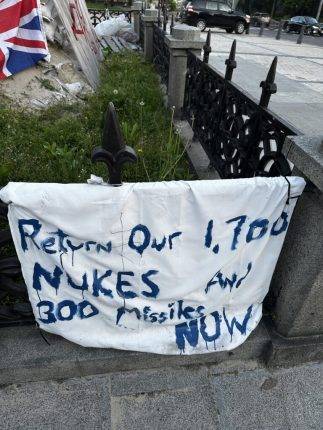
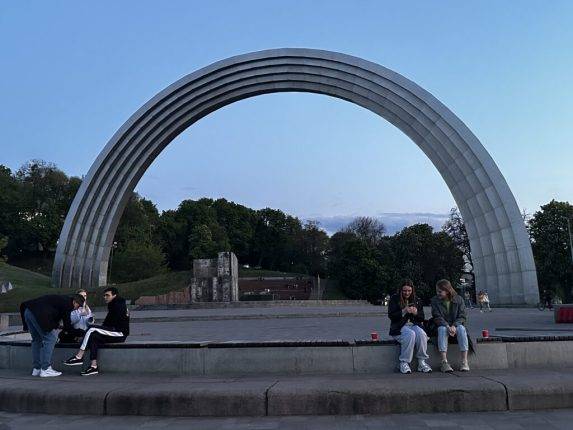
“We cannot lose this war,” agrees Maxim Lemanski from the Come Back Alive Foundation.
In its choice to defend its sovereignty, European future and break with the Kremlin forever, Ukrainian society is much more unequivocal and unified since the full-fledged invasion of Russia, than even with regards to the war in Donbas, which has been going on since 2014.
“Russia initiated this war, but our choice was to respond by fighting. There is no way that we can stop this war without our surrendering. If we don’t fight, we’ll lose the country. And this does not imply our nationhood only. This is a battle for our loved ones, for human lives. We are fighting with the Russian army, but the Russian army does not fight with the Ukrainian armed forces only – they are fighting with the whole of Ukraine,” says Artem Denisov, Director of the Ukrainian Veteran Hub.
* Nino Chichua travelled to Kyiv as part of a press trip for Georgian and Moldovan journalists, organised by EU NEIGHBOURS east in partnership with the international media NGO n-ost. The primary goal of the trip was fostering exchange and cross-border collaboration between journalists from Ukraine, the EU and the EaP countries, and to sustain the Ukrainian agenda and bring it back to the news feeds of leading EaP media.
Author: Nino Chichua
Article published in Georgian by Netgazeti.ge
Stories
-
Katarina Mathernova: If Ukraine had a human face and a human spirit, it would be 10-year-old Roman Oleksiv
-
A regional mission to drive social entrepreneurship: the story of Ksenia Kosukha
-
EU restores safe water supply for 100,000 Ukrainians affected by war
-
Promoting IT during the war: Lviv IT cluster and how EU4Digital helps
-
Frontline digitalisation: Kharkiv IT Cluster collaborations
-
How EU4Youth is driving opportunity and success among young Ukrainians
